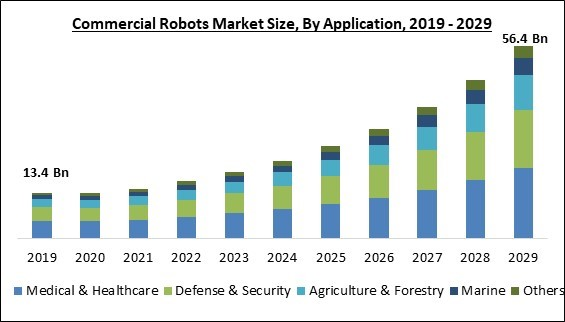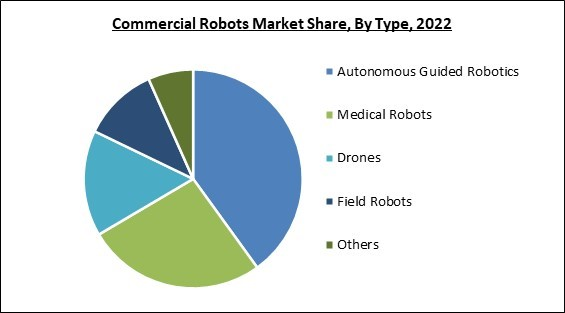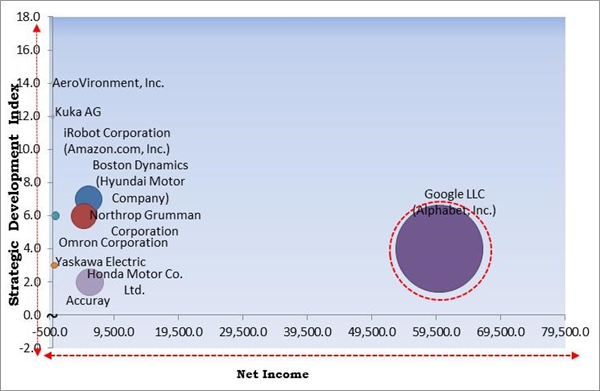Commercial robots are tools, a company employs to duplicate, supplement, or replace human labor. Consumer or personal robots that can perform chores in the house, like automatic floor cleaning, are different from commercial robots. Drones are one type of robot that has both personal and professional use. Commercial robots and autonomous, piloted drones are frequently utilized in the field for medical applications.
Commercial robots provide superior service to traditional techniques, probably increasing investment and usage. Drones are gaining popularity and being used in various contexts, including the commercial sector. Additionally, numerous startups and tech behemoths are investing in this technology to quickly increase their market share.
The market's primary growth driver, the ongoing transition from manual to automated operations, has increased the need for commercial robots. The smooth operation of industrial workflows depends on coordinating management, production, and control. Therefore, commercial robots have grown increasingly important since they simplify processes and increase the accuracy and efficiency of workflow.
The need for these robots is being driven by the expansion of small businesses, increased investment in automation, and stringent governmental regulations on handling hazardous materials and products. Similar to how they assist in the customization of machines and the production of autos, industrial robots carry heavy payloads. In addition, the advent of smart factories increases the market's potential.
COVID-19 Impact Analysis
COVID-19 has significantly influenced many businesses, including the automotive industry, resulting in a precipitous decrease in automotive sales. Due to the extensive usage of commercial robots in the automobile industry, there was a decline in the demand for commercial robots. In addition, the COVID-19 pandemic compelled several enterprises in the market for commercial robotics to temporarily cease operations to comply with new government rules to control the disease's spread. This suspension of activities immediately impacted the market's revenue flow.Market Growth Factors
Growing use of multimodal robot systems in agriculture
Ground and aerial vehicles must be coordinated to complete their respective missions. Large-scale farm automation will profit substantially from the control of several robots via a centralized software platform. Due to the ability of multimodal robotic devices to operate swarms of robots in farms to simultaneously perform various agricultural applications, like spraying and weeding, it is anticipated that market participants will adopt these types of systems in large numbers over the forecast period. Investments in multimodal systems are anticipated to expand the revenue streams of market participants in the commercial robots market.High ROI on cobots resulting in grown utilization
In comparison to conventional robots, cobots offer a significant return on investment. In addition to the prospective rise of robot adoption in many countries, their substantial return on investment is appealing to small and medium-sized enterprises. Also, the expense associated with installing collaborative robot-additional hardware exceeds the cost of this type of robot. In contrast, the cost of deploying regular industrial robot-additional hardware exceeds the cost of the robot itself. As a result, the increased interest in cobots is anticipated to contribute to expanding the market for commercial robots.Market Restraining Factors
Data privacy concerns and strict regulations
The lack of technology standardization further affects system integration, as the bulk of equipment manufacturers employ proprietary interface protocols for communications. In many instances, creating extra gateways is required for the translation & transfer of data between equipment from various manufacturers. An increasing number of businesses that provide agricultural software are attempting to acquire farmer data. Software vendors sell data to third parties or employ it in a manner that does not help farmers. These security concerns associated with agricultural drones may hamper their adoption. This would further slowdown the market growth in the upcoming years.Application Outlook
Based on application, the commercial robots market is segmented into medical & healthcare, defense & security, agriculture & forestry, marine and others. The medical & healthcare segment dominated the commercial robots market with the maximum revenue share in 2022. Robotic surgery is a minimally invasive surgery that uses robotic technology to carry out surgical procedures. The surgical procedures may be carried out precisely due to these robotic systems, which are controlled by surgeons and comprise miniature surgical instruments mounted on robotic arms.Type Outlook
By type, the commercial robots market is bifurcated into field robots, medical robots, autonomous guided robotics, drones, and others. The medical robots segment garnered a significant revenue share in the commercial robots market in 2022. The growing elderly population, who have decreased bone densities and frequently sustain fractures in accidents, is anticipated to increase demand for medical robots. Robotics represents the next wave of change, with automation becoming essential to pharmaceutical production, upholding higher precision standards, and reducing workload.Regional Outlook
Region wise, the commercial robots market is analyzed across North America, Europe, Asia Pacific and LAMEA. In 2022, the Asia Pacific region witnessed the largest revenue share in the commercial robots market. This is a result of the region's increasing automation levels in the industrial sector and the advancement of technology. Moreover, the two fundamental growth factors driving industrial automation are rising government initiatives in the manufacturing sector and a greater emphasis on economic diversification in emerging economies. Therefore, the most promising factor driving the market's significant growth over the forecast period in the region is the increasing commercial robot penetration across the regional market.The Cardinal Matrix - Commercial Robots Market Competition Analysis
The major strategies followed by the market participants are Product Launches. Based on the Analysis presented in the Cardinal matrix; Google LLC (Alphabet, Inc.) are the forerunners in the Commercial Robots Market. Companies such as Northrop Grumman Corporation, Boston Dynamics (Hyundai Motor Company), and AeroVironment, Inc. are some of the key innovators in Commercial Robots Market.
The market research report covers the analysis of key stake holders of the market. Key companies profiled in the report include Google LLC (Alphabet, Inc.), Omron Corporation, Boston Dynamics (Hyundai Motor Company), Northrop Grumman Corporation, iRobot Corporation (Amazon.com, Inc.), Kuka AG (Midea Investment Holding Co., Ltd.), Yaskawa Electric Corporation, Honda Motor Co. Ltd., Accuray Incorporated and AeroVironment, Inc.
Recent Strategies Deployed in Commercial Robots Market
Partnerships, Collaborations and Agreements:
- Sep-2022: Boston Dynamics signed an agreement with CNTXT, a cloud transformation company. This agreement would aim to accelerate the selection of its Spot robot for AI-based data processing and autonomous inspection at industrial sites across the Kingdom of Saudi Arabia.
- Mar-2022: KUKA Assembly & Test GmbH teamed up with Wiksfors Technology AB, a high-tech startup based in Sweden. The partnership would aim to facilitate accommodations produced on a large scale: assembled and constructed offsite.
- Jan-2022: KUKA came into an agreement with Ford Otosan, a Turkey-based automotive manufacturing company. Under this agreement, KUKA would supply 700 robots for Ford's latest electrical and connected commercial vehicle projects across Ford's plants in Kocaeli.
- Sep-2021: Honda Motor Co., Ltd. joined hands with Rakuten, a tech company that provides electronic commerce solutions. Through this collaboration, the company aims to run a trial robot delivery on the campus of the Ibaraki-based Uni. Additionally, the deployment of an automated vehicle built by Honda together with delivery boxes and systems developed by Rakuten.
Product Launches and Product Expansions:
- Mar-2023: OMRON unveiled the OMRON TM20 cobot, a payload of 20kg developed for tasks including material handling, palletizing, and machine tending. The product's feature includes a weighing, lightweight design at just 33kg. With these features the product is easy to combine with mobile robots, delivering high efficiency and flexibility in the industrial environment.
- Mar-2023: KUKA Robotics released the KMP 600-S diffDrive mobile robot, a mobile robot that works simultaneously with a KR IONTEC robot in a Mujin cell for packing and unpacking consumer goods. The product operates at the speed of two meters per second, the KUKA KMP 600-S diffDrive mobile platform automated guided vehicle (AGV) system uses 3D object detection and laser scanners to meet safety needs.
- Feb-2023: Kuka introduced KR 800, KR 480, KR 560, and KR 640, a series of Fortec industrial robotic arms. The product consists of five robot variants - each ideally suited to a particular application. Moreover, the launch aimed to fulfill the automotive industry’s changing needs, with larger vehicles, heavy batteries, and large components for electric cars.
- Sep-2022: AeroVironment introduced VAPOR 55 MX, the next-generation VAPOR Helicopter unmanned aircraft system. The company delivers new levels of operational performance with a completely redesigned modular autonomy framework; VAPOR 55 MX allows enhanced endurance and broadened payload capacity to meet emerging and current requirements of defense, industrial and commercial customers.
- Mar-2022: Boston Dynamics unveiled Stretch, the robot developed particularly for distribution and warehouse centers. The product makes logistics operations highly efficient and predictable and it enhances safety by taking on one of the most physically demanding jobs across the warehouse.
- Mar-2022: iRobot Corp. launched Roomba Combo j7+, the world's most advanced robot vacuum, and mop. The product consists of iRobot OS 5.0 updates, developed for saving time and keeping floors fresh and clean. Additionally, the Roomba Combo j7+ combined OS intelligence with hardware to offer customers a vacuum and mop solution.
- Feb-2022: Yaskawa Motoman, a subsidiary of Yaskawa Electric Corporation, announced the launch of HC10DTP and HC20DTP, the two latest collaborative robots for industrial applications. The product is suited for a broad range of collaborative applications consisting of machine tending, assembly, dispensing, and material handling.
- Sep-2021: Accuray Incorporated rolled out CyberKnife S7 System, an advanced device combining advanced precision, real-time artificial Intelligence, and speed. The product is the Next Generation CyberKnife platform, a robotic, non-invasive radiation therapy device capable of treating cancerous and benign tumors.
- Jul-2021: AeroVironment, Inc. released Crysalis, the company’s next-generation ground control solution. The Crysalis is combined software and hardware-baed ground control system that delivers control and command of compatible AeroVironment unmanned aircraft systems and their payloads, via an intuitive user experience.
- Apr-2021: iRobot Corp. rolled out iRobot H1 handheld vacuum, a vacuum for cleaning hard-to-reach places like stairs, couches, and curtains. The launch would aim to offer customers high purchase protection and flexibility including Protect+ and Protect extended warranties and better test results from iRobot select.
Acquisitions and Mergers:
- Dec-2022: Intrinsic, a company owned by Alphabet, took over Open Source Robotics Corporation, the arm of Open Robotics, and Open Source Robotics Corporation Singapore, the part of the business that led efforts on a project called Open-RMF for interoperability between physical infrastructure and fleets of robots. Following this acquisition, Intrinsic would aim to broaden its use and combination of ROS tools and create an intrinsic platform.
- May-2021: Aerovironment, Inc. acquired Telerob Gesellschaft für Fernhantierungstechnik mbH, a provider of advanced and comprehensive turn-key unmanned ground robotics solutions. The acquisition of Telerob marks a notable expansion to its offerings of multi-domain, intelligent robotic systems, from the mall and medium unmanned aircraft systems.
- Feb-2021: AeroVironment, Inc. completed the acquisition of Progeny Systems Corporation’s Intelligent Systems Group (ISG), a provider of related services to United States government customers. This acquisition would notably boost AeroVironment’s development of advanced autonomy abilities for the company's increasing suite of intelligent, multi-domain robotic systems and expand its advanced engineering services portfolio to defense and commercial customers.
Scope of the Study
By Application
- Medical & Healthcare
- Defense & Security
- Agriculture & Forestry
- Marine
- Others
By Type
- Autonomous Guided Robotics
- Medical Robots
- Drones
- Field Robots
- Others
By Geography
- North America
- US
- Canada
- Mexico
- Rest of North America
- Europe
- Germany
- UK
- France
- Russia
- Spain
- Italy
- Rest of Europe
- Asia Pacific
- China
- Japan
- India
- South Korea
- Singapore
- Malaysia
- Rest of Asia Pacific
- LAMEA
- Brazil
- Argentina
- UAE
- Saudi Arabia
- South Africa
- Nigeria
- Rest of LAMEA
Key Market Players
List of Companies Profiled in the Report:
- Google LLC (Alphabet, Inc.)
- Omron Corporation
- Boston Dynamics (Hyundai Motor Company)
- Northrop Grumman Corporation
- iRobot Corporation (Amazon.com, Inc.)
- Kuka AG (Midea Investment Holding Co., Ltd.)
- Yaskawa Electric Corporation
- Honda Motor Co. Ltd.
- Accuray Incorporated
- AeroVironment, Inc.
Unique Offerings
- Exhaustive coverage
- The highest number of Market tables and figures
- Subscription-based model available
- Guaranteed best price
- Assured post sales research support with 10% customization free
Table of Contents
Companies Mentioned
- Google LLC (Alphabet, Inc.)
- Omron Corporation
- Boston Dynamics (Hyundai Motor Company)
- Northrop Grumman Corporation
- iRobot Corporation (Amazon.com, Inc.)
- Kuka AG (Midea Investment Holding Co., Ltd.)
- Yaskawa Electric Corporation
- Honda Motor Co. Ltd.
- Accuray Incorporated
- AeroVironment, Inc.











